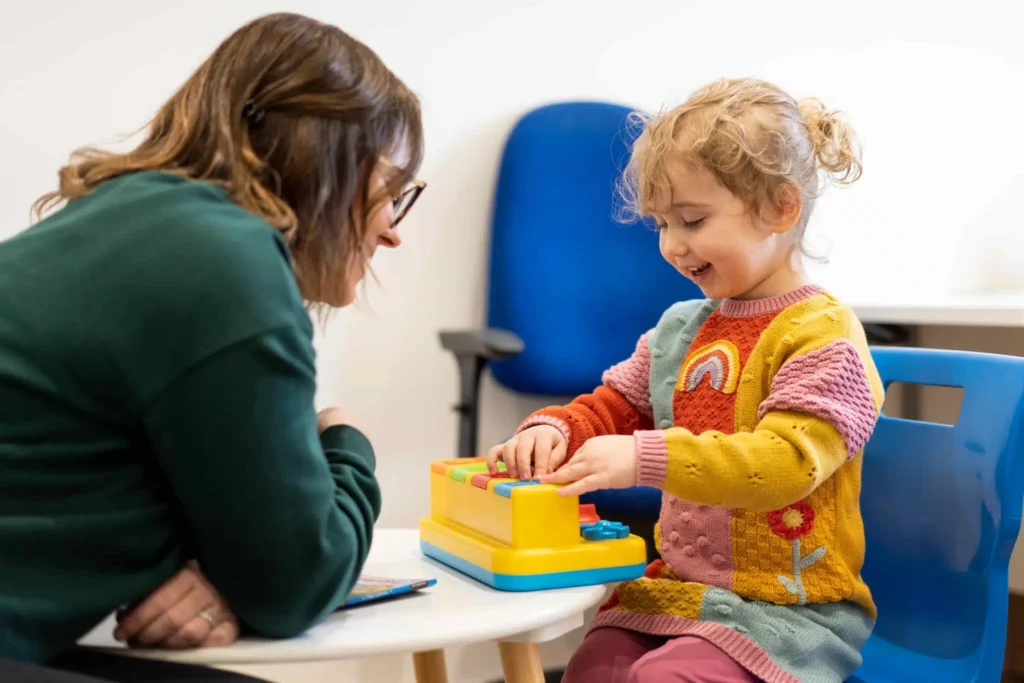UNLOCK ACCESS TO SUPPORT FOR YOUR CHILD
Child Autism Assessment
We offer your child or young person standard assessments through the self-pay routes to diagnose autism. We aim to unlock further support from local authorities and educational establishments.
These services are available via:
Self-pay
We understand that the prospect of attending an autism assessment can feel daunting or overwhelming for both the child concerned and for parents. We hope to make the process as smooth and comfortable as possible for you and your child by providing you with all the information you need.
Self-pay routes
Our autism assessments are available through the self-pay routes. Due to the pressure on NHS resources, our self-pay assessments can be accessed in a matter of weeks, as opposed to longer waiting times through the NHS. This availability means you can fit your child’s assessment to suit their development. Often, the optimum time for a diagnosis is before transitioning to a new school, which enables teachers and SENCOs to put the appropriate support in place for your child’s needs.
Before the assessment
Coming for an assessment can be anxiety provoking for both you and your child. Wherever possible we would ask that you try to explain to your child the reason for the assessment with Provide Wellbeing. We recommend that you are honest about the purpose of the assessment , particularly with older children, as this enables them to be fully involved in the diagnostic process. We understand that this is not always appropriate and recommend that you tell your child that the assessment is so that we can learn more about them and what they may find easy or difficult. At the assessment, the examiner will usually ask the child if they know why they are there. Alternatively, find out more about our triage process.
What if my child has ADHD?
Parents and carers need to understand that the assessment is not behavioural. Behaviours viewed as challenging at home should not be encouraged during the session. For our team, it is vital to assess social communication so the child should be as comfortable as possible. If the child is on ADHD medication, they must be administered the exact dosage on the day of the assessment.
Who will assess my child?
Provide Wellbeing uses a multidisciplinary team of registered clinical professionals. This can be made up of Paediatricians, Psychiatrists,, Speech and Language Therapists, Occupational Therapists, Social Workers and clinical psychologists. You can find more information of some of the professionals undertaking assessments here.
At Provide Wellbeing, we are skilled at exploring the challenges autistic children face, even if a parent is concerned that their child masks particularly well. It is not a behavioural assessment, so we want the child to feel as comfortable and settled as possible. The more relaxed they are, the easier we can spot the behaviours during the assessment.

The assessment
On arrival at the clinic, you and your child will be greeted by a team member and shown to the clinic room, where you will be introduced to the rest of the team. We will ask a range of questions about your child’s development, and you will have the opportunity to share your concerns. At the same time, your child will be assessed by the examiners in the other room. Your child will usually remain in one room with the examiners while you go to a separate room with another professional.
We use a flexible assessment approach to ensure that we meet the individual needs of everyone who attends an assessment. Tools may be used, such as the Autism Diagnostic Observation Schedule (ADOS-2), a standardised assessment which provides a series of contexts which allow the examiner to observe social communication, interaction and interests, behaviours and routines. The assessment is adapted depending on the person’s language level. We recognise that formal, standardised assessments are not always the most appropriate tool for some people, such as when someone is very anxious. Therefore, the examiners adapt their communication and assessment approach to support this. It is not a language assessment; the child or young person should feel like they are chatting and playing. Many children and young people enjoy the experience and find it fun. There are a variety of play-based activities for younger children.
For older children, the assessment is primarily conversational, exploring their thoughts and feelings about the possible diagnosis (if appropriate for their age), their emotions, social relationships and talking about their special interests, sensory preferences etc.
The professionals involved in the assessment meet for a discussion, where information from the assessment is used in conjunction with the additional information gathered (from education, third party reports etc) this meeting enables the team to determine whether the child meets the criteria for a diagnosis.
What will happen if my child is anxious?
The examiners are very experienced in working with anxious children and young adults in new situations. We do everything we can to put your child at ease. However, we understand that every child is different, and we will be as flexible as possible to ensure they feel comfortable. We can adjust the environment to suit them, such as if the lighting is problematic or if particular noises are triggering, we will look to mitigate those issues. We also have other activities, from colouring books to clay, to help the child relax and engage with our team.
If your child experiences any particular triggers, please inform a team member in advance so we can take appropriate precautions, including if your child has selective mutism.
Personal preferences
Before the assessment, we welcome any further information to enable us to create a relaxing and comfortable environment for the child. This information can include preferred pronouns or names, items or phrases to avoid, or anything else that can be anxiety-inducing. For younger children or children who are particularly anxious, we may ask you to stay in the room with them for the first part of the assessment or the entire duration.
HOW TO ACCESS
These services are available through

Available Through the NHS

Available Through Self-Pay
TALK TO US TODAY ABOUT
Child Autism Assessment
Call 0300 303 9966, email
provide.wellbeing@nhs.net or
complete the form below…
Pricing and appointments
| Service | Service Charge |
| Autism assessment | £1,900 |
This price is inclusive of VAT. The fee includes a diagnostic assessment with a multi-disciplinary team of professionals and includes a comprehensive written report – with detailed findings and support recommendations.
Cancellation of Self Pay Treatment
Our cancellation and refund policy is:
- If you cancel your appointment more than 7 days ahead of the appointment you will receive a full refund.
- Cancellations made between 7 days and 48 hours ahead of the appointment will be subject to a cancellation charge of 25% of the fee, unless you reschedule your appointment at the point of cancellation, in which case we will not charge a cancellation fee.
- Appointments that have already been rescheduled are not eligible for a refund.
- In the event you provide less than 48 hours’ notice of cancellation, or do not attend your appointment you will be liable for the full amount and no refund will be given.
- You will remain liable for any fees relating to treatment or diagnostics received up to the point of cancellation.
For full details of our refund and cancellation policy please visit our Pricing & Payment Terms.
If you have any questions about the Autism assessment itself or the process involved, please get in touch with our dedicated customer support team.
Combined Assessments
Autism and ADHD can come very closely linked. It is often more effective for a child or young person to have a combined assessment where they are assessed for autism and ADHD.
The parent or child can prefer the combined assessment as the assessments are carried out in the same appointment and are more cost-effective. But as we explore both conditions simultaneously, the assessment can be more lengthy.
Find out more in the short video.
Meet our team

Dr Pradeep Sahare
Consultant Neurodevelopmental Paediatrician
Dr Sahare is a Consultant Neurodevelopmental Paediatrician specialising in ASD, ADHD and developmental delay. He started working with Provide Wellbeing in 2008.

Dr Kamba Mpenge
Consultant Neurodevelopmental Paediatrician
With over 20 years’ practice in Paediatrics, Dr Mpenge is a Consultant Neurodevelopmental Paediatrician and Neurodisability Specialist.

Polly Larkin
Speech and Language Therapist
Polly qualified as a Speech and Language Therapist in 1996 after completing her BSc (Hons) in Birmingham, and returned to Essex in 2014 to work for Provide CIC.

Catherine Hudson
Occupational Therapist
Catherine has worked as an Occupational Therapist within the NHS for 32 years, with young people of all ages and a range of needs.

Alix Willmore
Speech and Language Therapist
Alix works with a wide range of children both in the NHS and independent practice, in special needs and mainstream schools.

Hayley Foster
Speech and Language Therapist
Hayley has worked with children, young people and adults with a range of communication needs including Autism and the Criminal Justice System.

Louise Pearce
Speech and Language Therapist
Louise specialises in working with children and young adults with Autism Spectrum Disorder (ASD) and Developmental Language Disorder (DLD).

Hannah Westwood-Loftus
Lead Occupational Therapist
Hannah has been working as Occupational Therapist since 2006, supporting children and adults within health and social care. She has a specialist interest in neurodevelopmental disorders, including Autism Spectrum Disorder (ASD). She helps to spearhead service development at Provide Wellbeing.

Amy Bignell
Lead Speech and Language Therapist
Amy has worked as a Speech and Language Therapist since graduating in 2007. She has specialised in the diagnosis of ASD and has worked as part of a diagnostic team since 2010. She is particularly passionate about working with girls and women as recognises that the diagnosis journey is often a lot more challenging for them. Amy helps to spearhead service development at Provide Wellbeing.

Dr Amin Band
Lead Neurodevelopmental Consultant
Dr Band is a Lead Neurodevelopmental Consultant, devising integrated pathways for Autism and ADHD in Mid Essex.

Dr Geetha Kugan
Consultant Neurodevelopmental Paediatrician
Dr Kugan is trained in ASD assessments and has been lead clinician for Provide CIC’s Community Paediatric service since 2010.
